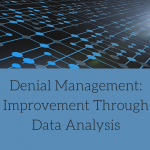| BHM has a proven success rate in denial management. Our team knows data management IS denial management with keys to quickly reduce or eliminate denials. Click here to learn more about how BHM can help you with denial management. |
 You know your reimbursement process needs attention when the response to an adverse determination is to resend the exact same paperwork through the pipeline. The Resend Shuffle may appear reasonable, but peel back the band-aid and you will find a process needing attention. Understanding data management is denial management begins the healing process.
You know your reimbursement process needs attention when the response to an adverse determination is to resend the exact same paperwork through the pipeline. The Resend Shuffle may appear reasonable, but peel back the band-aid and you will find a process needing attention. Understanding data management is denial management begins the healing process.
One proven way for evaluating slow or no payment results is an in-depth data analysis and reporting. By putting into place reporting measures to track the denial rates of your organization and then discovering why and where there are inefficiencies, is the first step in denial management.
Data Collection
Dynamic data gathering and analysis is key to pinpointing denial causation by denial type and payer. Set up a way to determine denial causation within your organization. Create an analysis of the twelve months of submitted claims. This will establish a baseline for determining the total amount of revenue lost due to denials.
Without a good reporting process and reporting software that collects valid and meaningful data, you will lose crucial data that can help improve your denial rate. Important data should include, but is not limited to: payroll, staffing, labor, payer mix, contracting, revenue cycle, accounts receivable, billing/expenses, supply costs, sales prospecting and closing, denials, utilization review, staffing, and costs of core services.
Data Analysis
Once you have a strong reporting process and data collection technique in place, assess outliers and discover where you highest denial rates are. By isolating this data you can now make recommendations and implementations for change.

Is there a solution to the problem? Is it a preventable problem? Who within your organization will be responsible for this implementation and on-going analysis of its efficacy?
Having access to valid and relevant data about your organization will not only help improve and reduce denial rates but it can also help you identify problems in your procedures or ways of reporting. This in turn helps to prevent and improve systems and processes within your organization, saving you money.
Data Management Is Denial Management
Interested in more control of your administrative expenses with better data reporting and analysis? BHM offers outstanding third-party, on-demand, peer review services allowing for more expense control.
Our detailed, web-based system connects processed case data into an interactive, data-mining report generator. Analyze case data detail by:
- Concordance rates
- Level of Care
- Review types
- Case manager submissions
- Reviewers utilized
Streamline your operations for optimal performance with enhanced control of useful data.
Case Study
BHM helped a Hospital System dramatically decrease denials and improve profits through in-depth data analysis.
- $800,000 in revenue was able to be recouped in 3 months due to performing an in-depth denials analysis.
- The in-depth approach included reasons for the denied claim, denial appeal status, provider and payer responses to authorizations, provider and payer responses to concurrent insurance claim denials, information regarding physicians and departments involved in insurance claim denials, case management notes, and level of care determination and revenue which was lost or at risk.
Pin-pointing the best data for improvements depends on your organization’s goals. Measuring the highest quality data can impact your returns much faster than the quantity of data.
BHM has a proven success rate in denial management. Our consultants know Denial Management Is Data Management with keys to quickly reduce or eliminate denials. Click here to learn more about how BHM can help you with denial management.
